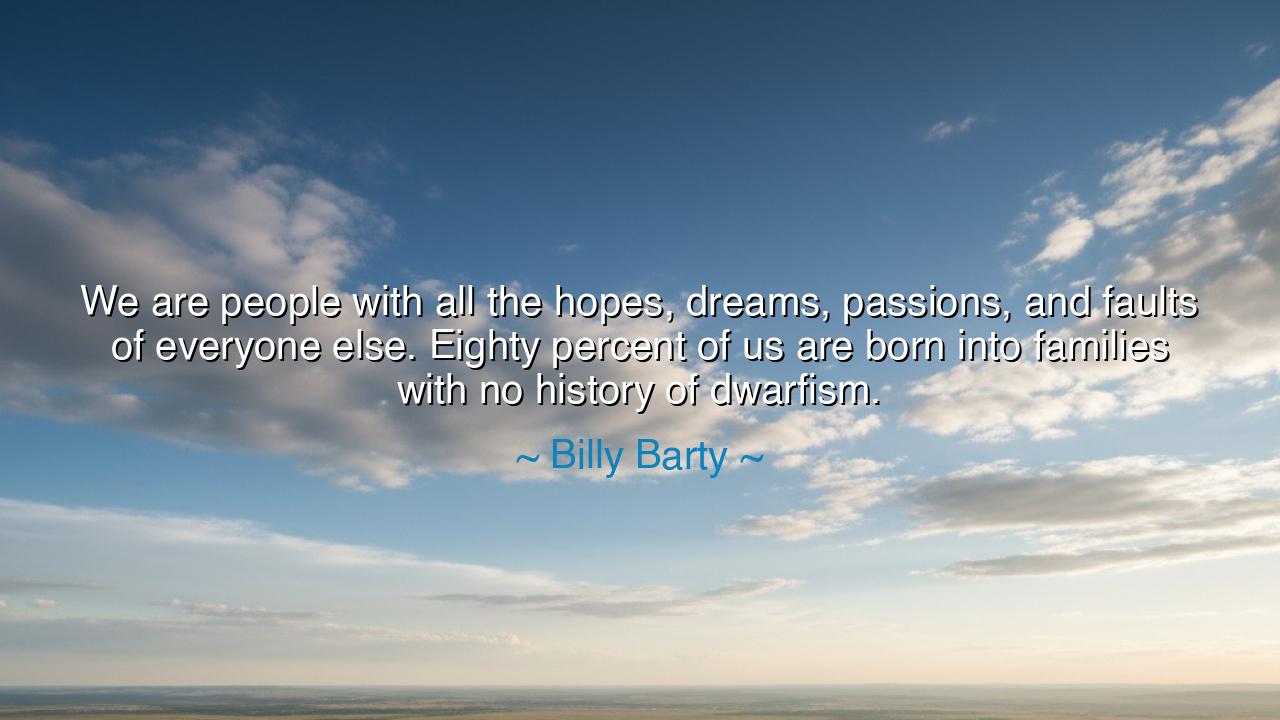
We are people with all the hopes, dreams, passions, and faults of
We are people with all the hopes, dreams, passions, and faults of everyone else. Eighty percent of us are born into families with no history of dwarfism.






When Billy Barty, the pioneering actor and activist, said, “We are people with all the hopes, dreams, passions, and faults of everyone else. Eighty percent of us are born into families with no history of dwarfism,” he was not only speaking about those with dwarfism — he was speaking about the human spirit itself. In these words, he sought to dissolve the wall between perception and truth, between the labels the world gives and the essence of what it means to be human. His statement is both declaration and plea — a call for recognition that beneath difference lies sameness, that the shape of a body does not define the shape of a soul.
The origin of this quote springs from Barty’s lifelong mission to elevate awareness of dwarfism and to challenge the prejudice that surrounds it. As an actor in Hollywood, he lived in a world that often valued appearance over substance, novelty over dignity. Yet he turned the stage into his pulpit, using his voice and presence to remind the world that dignity has no height. When he said these words, it was not from bitterness, but from compassion — to help others see that people with dwarfism do not belong to some alien category of existence, but to the same grand continuum of human experience: with hopes, dreams, and passions, as fierce and luminous as any other.
His mention that “eighty percent of us are born into families with no history of dwarfism” carries profound meaning. It reveals the universal randomness of human diversity — that what we call “difference” is not inheritance alone, but the infinite variety of nature’s design. It is as though Barty was saying: difference belongs to us all. Every child born into such a family brings both wonder and challenge — an invitation for society and kin alike to grow in understanding. This statistic shatters the illusion that difference can be isolated; instead, it lives among us, waiting to teach us empathy and acceptance.
In the ancient world, philosophers like Epictetus and Marcus Aurelius wrote that true greatness is not measured by appearance or status, but by the nobility of character. Their wisdom finds its echo in Barty’s words. Just as the Stoics taught that fate gives each of us a body and circumstance we cannot control, yet invites us to rise above them, Barty’s life demonstrated this truth through action. He refused pity and instead demanded equality. He used his visibility not to seek sympathy, but to awaken others to a simple truth: that all humans share the same inner landscape — joy, sorrow, ambition, and imperfection — no matter how different the vessel that carries them.
History gives us many examples of those who, like Barty, turned their difference into strength. Consider Helen Keller, who, deaf and blind, transformed her isolation into a bridge of communication that united the world. Or Stephen Hawking, who, confined to a chair, illuminated the cosmos with the power of thought. Like them, Billy Barty understood that limitations are not prisons but invitations — invitations to reveal the divine spark that dwells within all people. He took what others saw as smallness and made it a symbol of immense humanity.
Barty’s words also hold a mirror to the world’s collective conscience. When he says, “We are people with all the hopes, dreams, passions, and faults of everyone else,” he is teaching that to recognize humanity in another is to strengthen it within ourselves. Compassion, he implies, must not be selective; it must be as broad as the sky. The true measure of civilization lies in how it treats those who seem “different.” For every time we look upon another and see ourselves reflected — not in shape or size, but in spirit — we draw closer to the essence of wisdom itself.
And so, my child, take this teaching to heart: see beyond the form. Do not let the eyes deceive you into believing that greatness, beauty, or worth can be measured by the body. Look deeper, to where the soul burns bright with the same dreams that dwell within your own. Let the life of Billy Barty remind you that every person carries both fragility and fire — that difference is not a divide but a doorway into understanding. If you wish to live nobly, then honor each being you meet, for within them, as within you, lies the same eternal truth: we are all human, bound by the shared miracle of our hopes, our faults, and our dreams.






AAdministratorAdministrator
Welcome, honored guests. Please leave a comment, we will respond soon